外研版五年级英语下册知识点总结
外研版小学英语五年级下册复习重点资料

外研版小学英语五年级下册复习重点资料2.go to the park去公园3.play with friends和朋友玩4.ride a bike骑自行车5.read a book读书6.watch TV看电视7.have a ic 野餐8.swim in the pool在游泳池游泳9.go on a trip去旅行10.take photos拍照片句型1、询问他人是否有某物及回答句型例:Have you got a bike?问:Have/Has+主语+got+其他答:Yes。
I have。
或No。
I XXX’t.2、询问他人正在做某事及回答句型例:What are you doing?问:What+be+主语+doing+其他答:I am reading a book。
或I am not doing anything.3、描述他人正在做某事例:XXX.主语+be+动词ing+其他1.Linglin sent me an email about English food.2.She had an English breakfast and also had something for lunch.3.XXX which was very different from what she usually eats.4.Linglin asked me to cook Chinese food for her.5.She is going to tell me a story about her XXX.XXX've eaten: Subject + had + name of food + other details.To ask what someone is going to eat/drink: What are you going to eat/drink?XXX: What + did + subject + have + for XXX/dinner?Vocabulary:Library。
五年级下册外研版英语知识点总结
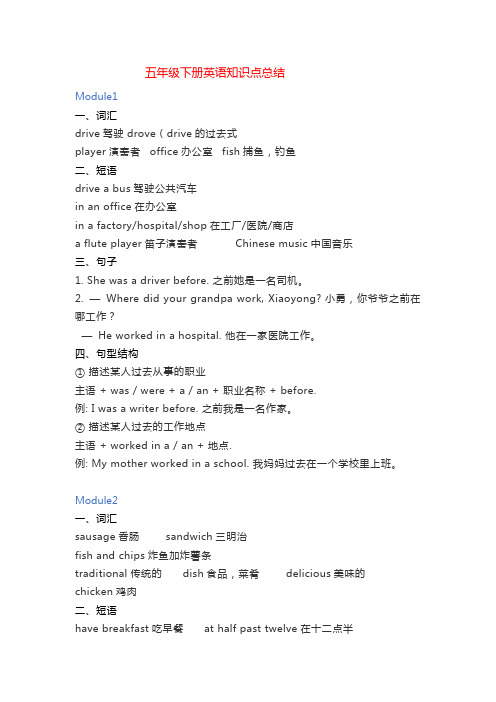
五年级下册英语知识点总结Module1一、词汇drive驾驶drove(drive的过去式player演奏者 office办公室 fish捕鱼,钓鱼二、短语drive a bus驾驶公共汽车in an office在办公室in a factory/hospital/shop在工厂/医院/商店a flute player笛子演奏者Chinese music中国音乐三、句子1. She was a driver before. 之前她是一名司机。
2. —Where did your grandpa work, Xiaoyong? 小勇,你爷爷之前在哪工作?—He worked in a hospital. 他在一家医院工作。
四、句型结构①描述某人过去从事的职业主语 + was / were + a / an + 职业名称 + before.例: I was a writer before. 之前我是一名作家。
②描述某人过去的工作地点主语 + worked in a / an + 地点.例: My mother worked in a school. 我妈妈过去在一个学校里上班。
Module2一、词汇sausage香肠sandwich三明治fish and chips炸鱼加炸薯条traditional传统的 dish食品,菜肴delicious美味的chicken鸡肉二、短语have breakfast吃早餐at half past twelve在十二点半三、句子1. —What did she have for breakfast? 早饭她吃了什么?—She had eggs and sausages. 她吃了鸡蛋和香肠。
2. It’s a traditional English dish. 它是传统的英式早餐。
四、句型结构询问某人一日三餐吃了什么—What did + 主语 + have for + breakfast / lunch / dinner?—He / She had ...例: —What did Lance have for dinner? 兰斯晚餐吃了什么?—He had noodles and an apple. 他吃了面条和一个苹果。
(完整版)外研版小学英语五年级下册知识点梳理
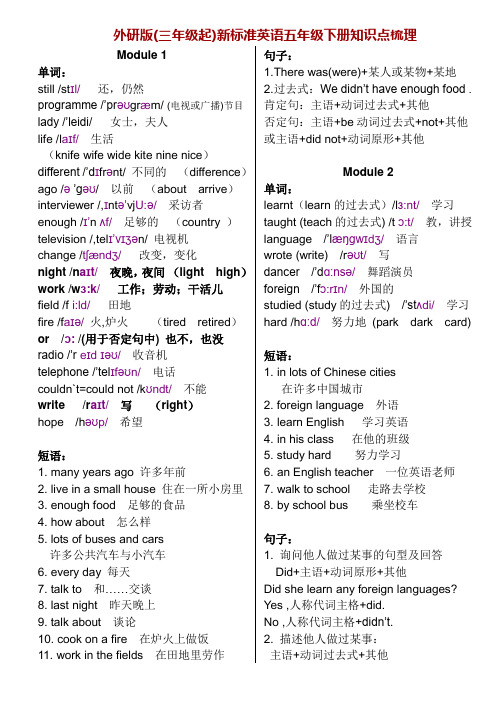
外研版(三年级起)新标准英语五年级下册知识点梳理Module 1单词:still /stɪl/ 还,仍然programme /’prəʊgræm/ (电视或广播)节目lady /’leidi/女士,夫人life /l aɪf/ 生活(knife wife wide kite nine nice)different /’dɪfrənt/ 不同的(difference)ago /ə’gəʊ/ 以前(about arrive)interviewer /,ɪntə’vj U:ə/ 采访者enough /ɪ’nʌf/ 足够的(country )television /,telɪ’vɪʒən/ 电视机change /tʃændʒ/ 改变,变化night /n aɪt/ 夜晚,夜间(light high)work /wɜ:k/ 工作;劳动;干活儿field /f i:ld/ 田地fire /f aɪə/ 火,炉火(tired retired)or /ɔ: /(用于否定句中) 也不,也没radio /’r eɪd ɪəʊ/ 收音机telephone /’telɪfəʊn/ 电话couldn`t=could not /kʊndt/ 不能write /r aɪt/ 写(right)hope /həʊp/ 希望短语:1. many years ago 许多年前2. live in a small house 住在一所小房里3. enough food 足够的食品4. how about 怎么样5. lots of buses and cars许多公共汽车与小汽车6. every day 每天7. talk to 和……交谈8. last night 昨天晚上9. talk about 谈论10. cook on a fire 在炉火上做饭句子:1.There was(were)+某人或某物+某地2.过去式:We didn’t have enough food .肯定句:主语+动词过去式+其他否定句:主语+be动词过去式+not+其他或主语+did not+动词原形+其他Module 2单词:learnt(learn的过去式)/lɜ:nt/ 学习taught (teach的过去式) /tɔ:t/ 教,讲授language /’læŋgwɪdʒ/ 语言wrote (write) /rəʊt/ 写dancer /’dɑ:nsə/舞蹈演员foreign /’fɔ:rɪn/ 外国的studied (study的过去式) /’stʌdi/ 学习hard /hɑ:d/努力地(park dark card)短语:1. in lots of Chinese cities在许多中国城市2. foreign language 外语3. learn English 学习英语4. in his class 在他的班级5. study hard 努力学习6. an English teacher 一位英语老师7. walk to school 走路去学校8. by school bus 乘坐校车句子:1. 询问他人做过某事的句型及回答Did+主语+动词原形+其他Did she learn any foreign languages? Yes ,人称代词主格+did.No ,人称代词主格+didn’t.2. 描述他人做过某事:She learnt English.3.描述他们现在在做某事:主语+be+动词ing+其他He is learning English now .Module 3单词:hamburger /’hæmbəgə/ 汉堡English /’ɪŋglɪʃ/ 英国(式)的breakfast /’brekfəst/早餐,早饭lunch /lʌntʃ/ 午餐,午饭sandwich /’sændwɪtʃ/ 三明治fish and chips/fɪʃtʃɪps/ 炸鱼加炸薯条traditional /trə’dɪʃənəl/ 传统的dish /dɪʃ/ 食品;菜肴gave(give的过去式)/g eɪv/ 给tonight /tə’naɪt/ 今夜,今晚短语:1. very much 很,非常2. an e-mail from Lingling一封来自玲玲的电子邮件4. about English food 关于英国食物5. have an English breakfast吃了一顿英式早餐6. have …for lunch 吃…作为午餐7. a traditional English dinner一顿传统的英式晚餐8. give …to … 把……给……9. at school 在学校句子:1.描述吃过某些食物:主语+ had + 食物名称+ 其他2.询问他人打算吃/喝什么:What are you going to eat/drink ? 3.询问他人三餐吃了什么:What + did + 主语+have+for breakfast / lunch / dinner ?Module 4单词:library /’l aɪbrəri/ 图书馆student /’stj U:dənt/ 学生sent(send的过去式) /sent/ 发送,寄idea /aɪ’dɪə/ 主意,想法put /put/ 放,安放heavy /’hevi/重的,沉的dictionary /’dɪk ʃənəri/ 词典;字典card /kɑ:d/卡片ask /ɑ:sk/邀请wrong /rɒŋ/错误的dear /dɪə/ 哎呀information /,ɪnfə’meɪʃən/ 信息project /’prɒdʒekt/ 项目guide /g aɪd/ 介绍,指南,手册film /fɪlm/ 电影way /w eɪ/方法,方式on关于短语:1. library card 图书卡,借书证2. on Shelf C 在C架上3. as well /æs wel/ 又,还,也句型:1.询问某物在何处及回答的句型:Where are the …about…, please?Where can you find out about …?You can find out … in / on …Module 5单词:light /l aɪt/ 轻的hard /hɑ:d/困难的,费力的department store /dɪ’pɑ:tm əntst ɔ:/百货商店pocket /’pɒkɪt/ 口袋,兜umbrella /ʌm’brelə/ 雨伞sales assistant /s eɪlzə’sɪstənt/售货员,营业员wheel /w i:l/ 轮子easy / i:zi/ 容易的,不费力的take /t eɪk/ 选择要,选择购买too /t U:/ 太,过于try /tr aɪ/ 试,尝试lovely /’lʌli/ 美丽的,可爱的;令人愉快的短语:1. at the department store 在百货商店2. buy you a new one 给你买一个新的3. be easy for you 对你来说很容易4. be too…for…对…来说太…5. take…to… 把…带到…句型:1. 描述事物特征的句型:It’s get……(big反义small,heavy反义light,easy反义hard)2. 表达看法:It’s + 形容词+ for +人称代词宾格Module 6单词:moon /m U:n/ 月亮,月球get /get/ 到达west /west/ 西,西部,西方;向西方parent /p eərənt/ 母亲;父亲;家长stay /st eɪ/ 停留(play day say)July /dʒʊ’laɪ/ 七月south /s aʊθ/南,南部,南方;向南方remember /rɪ’membə/ 记得June / dʒ U:n/ 六月east / i:st/ 东,东部,东方;向东方best /best/ 最好的north /nɔ:θ/北,北部,北方;向北方rest /rest/ 休息rode(ride的过去式)/rəʊd/ 骑短语:1. have a rest 休息一下2. of course 当然3. in the west of China 在中国的西部4. go there 去那儿5. last year 去年6. stay with 和……呆在一起7. in July 在七月8. every year 每年9. Li people 黎族人10. ride a horse 骑马句型:1.用方位词表达地点:It’s in the north / south / east / west of…Module 7单词:evening /‘ɪvənɪŋ/傍晚,晚上late /l eɪt/近日暮的;近深夜的;时间不早的worker /’wɜ:kə/ 工人factory /’f æktəri/ 制造厂;工厂early /’ɜ:li/ 早的taxi /’t æksɪ/ 出租车,计程车quarter /’kwɔ:tə/ 一刻钟to(距整点)差......worry /’wʌri/ 焦虑,担心短语:1. go to work 上班2. be home 在家句型:1. My father goes to work at eight o’clock every morning.2. What does he do?He’s a policeman/worker.3. What does she do?She’s a taxi driver.4.Will you be home at seven o’clock? Yes, I will. I’ll be home at seven o’clock.5. What time will you be home?I’ll be home at seven o’clock.6.英语时间的表达法:1)整点:8:00——eight o’clock2)分钟小于或等于30,就用past来表示,结构:分钟+ past + 该点钟12:05—— five past twelve9:30——half past nine3)分钟大于30,就用to来表示,结构:分钟+ to + 下一点钟8:40——twenty to nine4)分钟是15,一般用a quarter 来代替fifteen。
外研版五年级下册英语复习重点
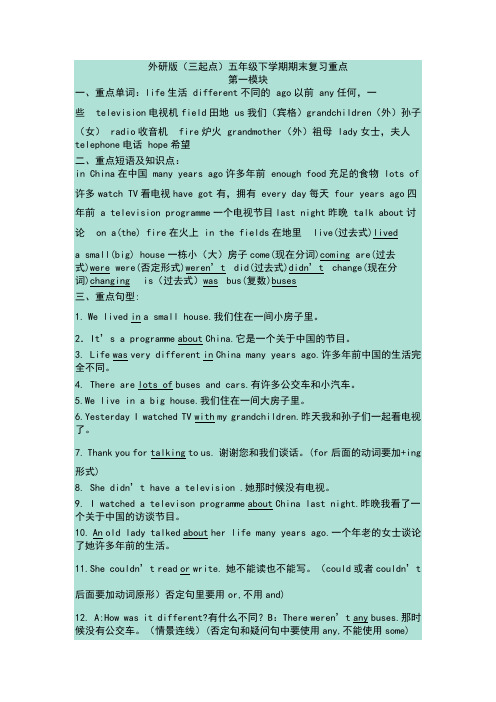
外研版(三起点)五年级下学期期末复习重点第一模块一、重点单词:life生活different不同的ago以前any任何,一些television电视机field田地us我们(宾格)grandchildren(外)孙子(女)radio收音机fire炉火grandmother(外)祖母lady女士,夫人telephone电话hope希望二、重点短语及知识点:in China在中国many years ago许多年前enough food充足的食物lots of 许多watch TV看电视have got有,拥有every day每天four years ago四年前 a television programme一个电视节目last night昨晚talk about讨论on a(the) fire在火上in the fields在地里live(过去式)liveda small(big) house一栋小(大)房子come(现在分词)coming are(过去式)were were(否定形式)weren’t did(过去式)didn’t change(现在分词)changing is(过去式)was bus(复数)buses三、重点句型:1.We lived in a small house.我们住在一间小房子里。
2.It’s a programme about China.它是一个关于中国的节目。
3. Life was very different in China many years ago.许多年前中国的生活完全不同。
4. There are lots of buses and cars.有许多公交车和小汽车。
5.We live in a big house.我们住在一间大房子里。
6.Yesterday I watched TV with my grandchildren.昨天我和孙子们一起看电视了。
外研版(三起)英语五年级下册 全册知识点归纳

Module 1 一、语音知识ai一一一[el]一一-rain, main, waitar一一一[eI]一一一farmer,far, park, part y -play, ma y, day,au一一一[::>: ]一一-autumn, August, author -warm, quait缸,二、动词原形R对应的过去式al一一[::>: ]一一-walk, talk, tall a y一一[e I]一ar一一[:): ]一1.am/is”was2.are-weree -came4.watch -watched5.live-lived6.do-did7.get -get8.talk talked9.飞w ork-worked IO.can-could II.cook-cook巳d12.hav巳-had 13.read-read14.write =wrote IS.miss-missed16扣mp-jumped 三‘词汇still还,仍然programme (电视或广播)节目l ady女士,人life生活different不同的巳nough足够的television电视机式)(外)孙子;(外)孙女闰work工作;劳动;干活儿ago 以前interviewer采访者grandchildren ( grandchild的复数形change改变,变化night夜晚,夜field田地fire火,炉火or (用于否定句中)也不,也没radio收音机1巳lephone电话hope希望couldn’t = could not不能writ巳写四、短i吾Ii v e in住在......watch TV看电视on the chair在椅子上a small village一个小忖庄talk about谈论onl y one只有一个in the fields在田地里last night昨天晚上last night昨天晚上巳very day每天lots of =a lot of 大量,许多enough food足够的食物be different from与......不同on a fir巳在火上on foot步行a pr吨ramme about一个关于....节目thank you for. ..谢谢你......五、句子l.There are two beautiful cats on the chair.高两只漂亮的小猫在椅子上。
(完整版)【原创】外研社五年级英语下册知识点梳理
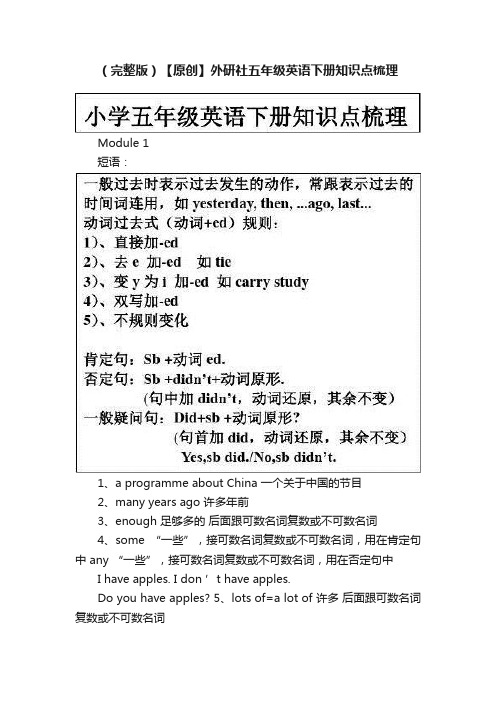
(完整版)【原创】外研社五年级英语下册知识点梳理Module 1短语:1、a programme about China 一个关于中国的节目2、many years ago 许多年前3、enough 足够多的后面跟可数名词复数或不可数名词4、some “一些”,接可数名词复数或不可数名词,用在肯定句中any “一些”,接可数名词复数或不可数名词,用在否定句中I have apples. I don ’t have apples.Do you have apples? 5、lots of=a lot of 许多后面跟可数名词复数或不可数名词6、every day 每天7、Thank you for doing 感谢你做了某事 8、and 和or 都表示“和” and 用在肯定句中or 用在否定句和问句中9、talk about sb/sth 谈论某人/某物 10、grandchild (复数)grandchildren句子:1、We lived in a small house.2、There weren ’t many buses. **There be 的过去时:There was+a/an+可数名词单数+地点。
There was+a/an+不可数名词+地点。
There were+可数名词复数(s)+地点。
3、We live in a big house.4、There are lots of buses and cars.5、He can jump really far. Thank you for doing 感谢你做了某事语法:一般过去时Module 2短语:1、learn to do 学习做某事2、like doing 喜欢做某事3、study very hard 努力学习4、an English teacher 一个英语老师5、动词词尾加上“er ”变成名词,表示职业。
dance--dancer drive---driver work--worker farm--farmer teach--teacher sing--singer write--writer play--player另外还有表示职业的单词:nurse (护士)、doctor (医生)、policeman (警察)、firefighter (消防战士)、pupil (小学生)、student (学生) 6、make a cake 做蛋糕 7、不规则动词过去式:learn--learnt teach--taught write--wrote drink--drank (study---studied)句子:1、--Did your grandma learn any foreign language? --Yes,she learnt English.2、He ’s learning English now.Sb be(am/is/are) doing.某人正在做某事。
小学英语外研版五年级下册模块知识点
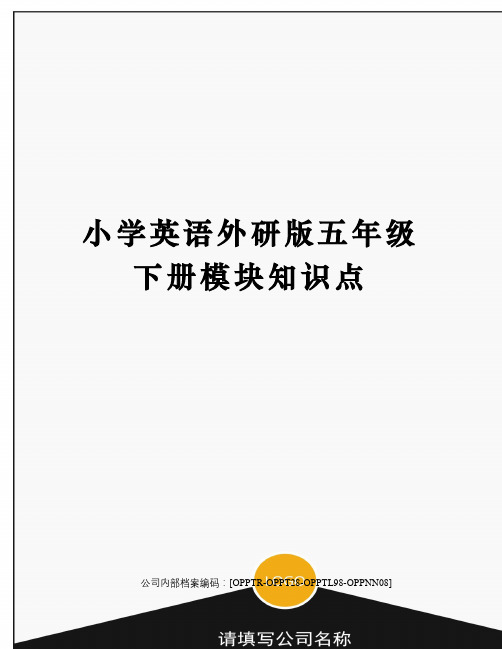
小学英语外研版五年级下册模块知识点公司内部档案编码:[OPPTR-OPPT28-OPPTL98-OPPNN08]Module 1 Unit 1重点句子:1.She was young in this picture.她在这张照片里很年轻.否定句:She wasn’t young in this picture.一般疑问句:Was she young in this picture2. She was a driver before.她以前是一个司机.否定句:She wasn’t a driver before.一般疑问句:Was she a driver before肯定回答:Yes, she was. / No, she wasn’t.就划线部分提问:What was she before3.He played Chinese music.他演奏中国音乐.否定句:He didn’t play Chinese music.一般疑问句:Did he play Chinese music肯定回答:Yes, he did. / No, he didn’t.就划线部分提问:What music did he play4.I can play the flute, too. = I can also play the flute.我也会演奏笛子.5. She drove a bus.她开公共汽车.就划线部分提问:What did she drive6. He teaches us English.他教我们英语.就划线部分提问:What does he teach us7. She helped children.她帮助了孩子们.就划线部分提问:What did she do重点单词:1. grandma2. picture祖母,奶奶图片,照片3. player 玩家,演奏者,运动员,演员Module 1 Unit 2重点句子:1.My grandpa worked in an office.他在办公室工作.否定句:My grandpa didn’t work in an office.一般疑问句:Did your grandpa work in an office肯定回答:Yes, he did. / No, he didn’t.就划线部分提问:Where did your grandpa work2.My mother works in a hospital.我(de)妈妈在医院上班.否定句:My mother doesn’t work in a hospital.一般疑问句:Does your mother work in a hospital 肯定回答:Yes, she does. / No, she doesn’t.就划线部分提问:Where does your mother work3.My parents work in a factory否定句:My parents don’t work in a factory.一般疑问句:Do your parents work in a factory肯定回答:Yes, they do. / No, they don’t.就划线部分提问:Where do your parents work4.There were no computers like there are today.过去不像今天这样,有电脑.5. I was a teacher before.就划线部分提问:What were you before重点单词和短语:1. office2. factory3. hospital办公室工厂医院4. parents 6. shop 7. in the sun父母商店在阳光下very hard工作非常努力Module 2 Unit 1重点句子:1.I’ve got an email from Lingling. 我收到玲玲发(de)一封电子邮件.2.It’s about English food. 它是关于英国食物(de).3.Yesterday she had an English breakfast. 昨天她吃了一顿英国式早餐.4.She had eggs and sausages for breakfast. 她早餐吃了鸡蛋和香肠.否定句:She didn’t have eggs and sausages.一般疑问句:Did she have eggs and sausages肯定回答:Yes, she did. / No, she didn’t.就划线部分提问:What did she have for breakfast5.It’s a traditional English dinner. 它是一顿传统(de)英国式晚餐.6.She says it’s delicious.否定句:She doesn’t say it’s delicious.一般疑问句:Does she say it’s delicious肯定回答:Yes, she does. / No, she doesn’t.就划线部分提问:What does she say重点单词:1. email2. food3. breakfast4. lunch电子邮件食物(不可数)早餐午餐5. dinner6. sausages7. sandwiches8. chips晚餐香肠三明治薯条9. traditional 10. delicious 11. different传统(de)好吃(de)不同(de)Module 2 Unit 2重点句子:1.English people usually have breakfast at seven o’clock. 英国人通常在7点钟吃早餐.就划线部分提问:What time do English people usually have breakfast2.Sundays are special in England. 在英国每周日是很特别(de).3.Families usually eat lunch together. 家人们通常一起吃午餐.4.They eat chicken, potatoes and vegetables. 他们吃鸡肉,土豆和蔬菜.5.On Fridays, many people eat fish. 在每个周五,许多人吃鱼.6.He has dinner at half past twelve.就划线部分提问:What time does he have dinner7.She has biscuits and noodles.What did she have重点单词:1. England2. usually3. special4. families英国通常特别(de) family(de)复数5. together6. chicken7. potatoes8. vegetable一起鸡,鸡肉 potato(de)负数蔬菜9. want to do sth.想要做某事.10.food食物/ meat肉/ fish鱼肉/ chicken鸡肉这几个词都是不可数名词.Module 3 Unit 1Wordsreturn 归还 computer计算机,电脑 like 喜欢card 卡片,名片 week 星期,周video 录像,视频 shelf架子library 图书馆favourite 特别喜欢(de) return 归还Phrasein China 在中国 on the computer 在电脑上at the library 在图书馆in two weeks 在两周内 library card 借书卡 on shelf 在书架上lend…to… 把…借给…borrow…from… 从…借入本课语法点1. have got/haven’t gothave got是表示“有”(de)意思;什么时候用have got,什么时候用has got 取决于主语,如果主语是第三人称单数,就用has got,其它(de)就用have got.如果要对have/has got表示否定,只须在have/has后加上not即可,have not可以缩写成haven’t;has not可以缩写成hasn‘t.2.Have…got /Yes/NoHave got(de)—般疑问句是: Have/Has sb got…如: Have you got a sandwich你有一块三明治吗具体是用have还是用has就由sb(de)人称决定. Have you got…是—般疑问句,回答要用yes和no.Module 3 Unit 2Wordsborrow 借入;借来zoo动物园 wear 穿着bookshop 书店 school 学校 talk 谈话,讲话hear 听说,听到park 公园 friend 朋友type n.类型,品种 v.打字Phraselots of 很多,大量 talk to sb. 对某人说话use the computer 使用电脑 borrow books借书do your homework 做你(de)家庭作业English libraries 英国(de)图书馆in a library 在一个图书馆 so much 如此多talk to your friends 和你(de)朋友们交谈lots of stories 很多故事本课语法点1. can/can’tcan是情态动词,这里表示“能,会”(de)意思,用来表示能力,后面接上动词原形,这一点同学们要记住哦.情态动词“can“可以用来表示“会……”,can‘t表示“不会……”(de)意思.2. 学习部分介词(de)用法with是介词,可以表示“用”(de)意思;with还有“和…一起”(de)意思.with后面可以加工具类(de)名词,例如:Cut it with a knife.(用刀切开它.)工具、器具、材料类(de)名词都和with这个介词搭配,表示“用(某种工具)……”.介词for后面接某人,表示动作(de)对象或者接受者,意思是“给……”、“对……(而言)”.当我们表达几点钟(de)时候,我们必须用at.“in”和“at”(de)区别:在英语中at和in都可以作为表示场所(de)介词,但是at表示某地点(表示比较小或狭窄(de)场所),而in表示在某地(表示比较大或宽敞(de)场所)Module 4 Unit 1Wordsfine(身体)很好 sent (send(de)过去式)寄get 收到;接到chocolate 巧克力read 读game游戏 ate (eat(de)过去式)delicious 美味(de) America 美国Phrasecome to 来到 live in 在……居住 last week 上星期a Maths game 一个数学游戏English books 英语书my chocolate 我(de)巧克力 send you 寄给你some books 一些书 this summer 这个夏天本课语法点1.Did…一般过去时(de)一般疑问句.一般疑问句中要用到助动词did,把did提至句首,其他句子结构保持不变.另外,一般疑问句中(de)行为动词也要用原形表示.—般过去时一般疑问句(de)回答.用Yes,…/N0,…来回答,助动词要用did,以保证问句答句时态一致.2.宾格it/them人称代词(de)宾格有:me,us,you,her,him,it,them等.宾格用在动词和介词之后.Module 4 Unit 2Wordsseason 季节 birthday 生日 winter冬天spring 春天 summer 夏天July七月August 八月leaf 树叶 temperature温度,体温 autumn 秋天 sandal 凉鞋 wood 木头,木材glove手套 breeze 微风Phrasefavourite season 最喜爱(de)季节smell good 闻起来味道很好 in the sky 在天空中go swimming 去游泳 play with玩…..,和……一起玩a breeze 一阵微风 fall off 从……跌落in the wood 在树林里 on the tree 在树上(长在树上)in the tree 在树上(不长在树上)the baby ducks 小鸭子们本课语法点1.What is…favorite…What’s your favorite… 这个句型可以用来询问别人最喜欢(de)东西是什么. 2.季节(de)学习3.When…when是特殊疑问词,等于what time,是用来提问时间.what time只用于询问钟点,而when可以用来询问日期、钟点、星期几等.Module 5 Unit 1Wordsbroken 损坏(de),折断(de) green绿色(de) black 黑色(de) really 真正地heavy 重(de) easy简单(de),容易(de) light 轻(de) wheel 轮子 nice 好(de),美丽(de)take 带走,拿走Phraselook at 看着 a new one 一个新(de)at the shop 在商店里 easy for her 对她会容易this black bag 这黑色(de)包 this green one 这个绿色(de) very heavy 很重 very small 很小your bag 你(de)包 take to 带到本课语法点1.学习形容词broken/new/heavy/light2.学习颜色类(de)词汇3. Be + adj.for sb.good for sb(de)两个解释:l.对某人有好处.2.(表示祝贺)干得好.sth is good/bad for sb:某事物对某人有好/坏处.Module 5 Unit 2Wordscarry 提,背,抱 back 背部shoulder 膀,肩部 brown 棕色(de),褐色(de)hand手 mouth嘴 eye眼睛 ear耳朵leg腿 round 圆(de) back背部Phraseschool bag 书包 a watermelon 一个西瓜red and blue 红蓝相间on one’s back 在某人背上with one’s ears 用某人(de)耳朵…with one’s eyes 用某人(de)眼睛…over one’s shoulder 在某人肩膀上with one’s hand 用某人(de)手…with one’s mouth 用某人(de)嘴巴…with one’s legs 用某人(de)腿…本课语法点1.感官动词2. see/hear/eat/walk with…表示听觉(de)时候,我们通常用到(de)动词是listen和hear,它们都是“听”(de)意思.表示触觉(de)时候我们主要用到feel和touch这两个动词,它们都是“触摸”(de)意思.表示嗅觉(de)时候,我们通常用smell这个动词,它(de)意思是“闻”.表示味觉(de)时候,我们常用taste这个动词,它(de)意思是“品尝”.表示视觉(de)单词主要是look和see,这两个单词都是“看”(de)意思.表示感觉(de)感官动词:see(看见),hear(听见)等,这些词是没有进行时态(de).with后面(de)名词可以是身体上(de)某个部位,通常和感官动词连用.Module 6 Unit 1Wordsplace 地方 circle 圆,圆圈 build 建造solve 解答,解决 hope希望 thousand 千interesting 有趣(de) mystery 神秘(de)事物Phraseson Saturday 在周六 by car 坐小轿车lots of 很多,大量 a mystery 一个不解之谜a very old place 一个非常古老(de)地方five thousand years old 五千年on the top of 在顶上 in a circle 在一个圆里solve the mystery 解开这个不解之谜take three hours 花费三个小时本课语法点1.一般将来时willwill作动词,意思是“将”,表示将来发生(de)事情.一般将来时(de)结构为:主语+will+动词原形,其中当主语为第一人称时也可以表达为: I/we+shall+动词原形.一般将来时(de)否定句是在will后面加not,will not=won‘t 有will(de)一般将来时(de)句子,常常与表示将来(de)时间状语连用,例如:tomorrow明天, next time下一次,this Sunday这个周日等.there be句型是“有,存在”(de)意思.它(de)一般将来时可以用there will be来表示.2. be going to/will3. will(de)特殊疑问句一般将来时(de)疑问句是把Will/shall放在主语前面. Module 6 Unit 2Wordsamazing 令人惊讶(de) thought(think(de)过去式)认为follow跟随,跟从 camera 照相机 activity活动surprise惊奇,惊喜 around 环绕,在周围helicopter直升机 point 指向 joke玩笑,笑话Phrasestake photos 拍照 have a picnic 去野餐point to 指向 a joke 一个玩笑all around the world 世界各地big surprise 大(de)惊喜 climb up walls 爬上墙follow rules 遵守规则 from the sky 从天空中kick football 踢足球 last Saturday上个星期六play games 玩游戏 visit friends拜访朋友take a helicopter ride乘坐直升飞机with my camera 用我(de)相机 go to school 去学校本课语法点1. all around the world2.介词(de)学习“think about”,意思是思考,考虑.over可以作为方位介词使用,它(de)意思是“在……上面(但不接触到)”.on表示“在……上面”,强调与某物体有接触.over也可以表示方位,强调在某人或某物(de)正上方,而且两物体表面没有接触.up有向上(de)含义.来看表示处所方位(de)介词:at/in/on都表示“在…”,at 表示“在…内”,用于内部;on意为“在…上面”,用于表面接触.表示在某地时,at后接小地方,in后接大地方.with后面可以加工具类(de)名词,例如:Cut it with a knife.(用刀切开它.)工具、器具、材料类(de)名词都和with 这个介词搭配,表示“用(某种工具)……”.Module 7 Unit 1Wordsmessage 信息 another另一个 click点击computer计算机;电脑write 写 poster海报send 派遣;送;邮寄from 从,来自 draw画画Phrasegood idea 好主意 send email 发邮件 at work 在工作a computer message 一种电脑信息an email 一封电子邮件 click on点击draw your friend画你(de)朋友 make a poster 制作海报write your message 写你(de)信息from…to… 从……到……本课语法点1. give sth to sbgive意思是“给”,表示给某人时,要加介词to.2. another(de)用法another是“另一个,再一个”(de)意思.one表示“一个”,another泛指“另一个”;两个中(de)“另一个”是the other;不定数目中(de)“另一个”是another.3.from…to…from…to…,是从……到……(de)意思.Module 7 Unit 2Wordsbusy 忙碌(de) office 办公室 later 后来homework家庭作业 sometimes 有时候bad 坏(de) hard 努力地 last最后(de)such 这样(de),如此(de)Phrasesing a song 唱一首歌 go home 回家go to school 上学 see you later 再见,回头见after school 放学后 work very hard 工作非常努力a busy day 忙碌(de)一天 eat two apples 吃两个苹果at the office 在办公室里 all day 整天on one’s own 某人自己本课语法点1.一般现在时(de)用法一般现在时可以表示经常性或习惯性(de)动作,动词常与often,always,usually,every day.sometimes,now and then等时间状语连用.瞬间动词find(找到),wake(醒),die(死)等,这些表示一瞬间发生(de)动作(de)词语是没有进行时态(de).表示态度、感情和心理状态等(de)动词.like(喜欢),love(爱),know(知道),hate(恨这些词都是没有进行时态(de).2. it is time for sb to doIt’s time to do sth/It’s time for sth=是做某事(de)时候了.3. so(de)用法so可以用作程度副词,意思是“很,非常”.Thank you so much. 非常感谢.Module 8 Unit 1Wordspresent 礼物 dragon 龙 windy 多风make 制作,做 great 杰出(de),了不起(de)cousin 堂(表)兄弟/妹 chopsticks 筷子so 这么,那么PhraseOf course. 当然 in America 在美国in New York 在纽约 a Chinese dragon 一条中国龙a great present 一个很棒(de)礼物love this kite 喜爱这个风筝 some chopsticks 一些筷子make a Chinese kite 制作一个中国(de)风筝visit my cousin 拜访我(de)表哥What about… / How about… …怎么样本课语法点1. Will(de)一般疑问句及问答一般将来时(de)疑问句把will/shall放在主语前面.“will the rabbit+动词原形…(……将会……)”肯定回答“Yes,it will.”;否定回答“N0, it won’t.”2.think / I think…I think后面是一个完整(de)句子作宾语,这样(de)句子称为宾语从句.Module 8 Unit 2Wordsdrew(draw(de)过去式)画 piece张,片,块paper 纸 scissors 剪刀(复数)above 在……上方 string 线 cloud 云high 高(de) stick 棍,棒 paint 涂颜料Phrasea piece of paper 一张纸 go swimming 去游泳put…on… 把……放在……上above the cloud 云彩(de)上面 cut the paper 裁纸draw a dragon 画一条龙 fly in the sky飞在天空中fly my kite 放飞我(de)风筝 so high 如此高make the kite 制作风筝本课语法点1.介词above(de)用法above是介词,意思是.在…上面.above强调位置在某物体(de)上方,并不一定是正上方,而且两物体表面也没有接触.above/over/on表示“在…上面”.“above”(de)意思是“在…之上”,表示相对高度,不一定是在正上方,其反义词below.2.疑问词how(de)学习how引导疑问旬时意为“怎样,如何”等,是询问方式.比如.可以用how来询问对方或他人如何到达某地.A:How do you get to school你是怎么到校(de)B:I walk to school我不行到校(de).How也可以用来询问天气.How is the weather today / What’s the weather like today今天(de)天气怎么样。
外研版五年级英语下册各单元知识点汇总
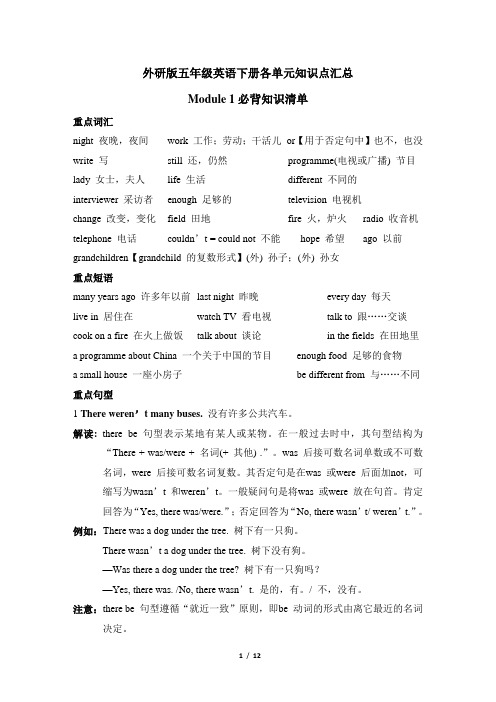
外研版五年级英语下册各单元知识点汇总Module 1必背知识清单重点词汇night 夜晚,夜间work 工作;劳动;干活儿or【用于否定句中】也不,也没write 写still 还,仍然programme(电视或广播) 节目lady 女士,夫人life 生活different 不同的interviewer 采访者enough 足够的television 电视机change 改变,变化field 田地fire 火,炉火radio 收音机telephone 电话couldn’t = could not 不能hope 希望ago 以前grandchildren【grandchild 的复数形式】(外) 孙子;(外) 孙女重点短语many years ago 许多年以前last night 昨晚every day 每天live in 居住在watch TV 看电视talk to 跟……交谈cook on a fire 在火上做饭talk about 谈论in the fields 在田地里a programme about China 一个关于中国的节目enough food 足够的食物a small house 一座小房子be different from 与……不同重点句型1 There weren’t many buses.没有许多公共汽车。
解读: there be 句型表示某地有某人或某物。
在一般过去时中,其句型结构为“There + was/were + 名词(+ 其他) .”。
was 后接可数名词单数或不可数名词,were 后接可数名词复数。
其否定句是在was 或were 后面加not,可缩写为wasn’t 和weren’t。
一般疑问句是将was 或were 放在句首。
肯定回答为“Yes, there was/were.”;否定回答为“No, there wasn’t/ weren’t.”。
小学五年级下册英语知识点外研版
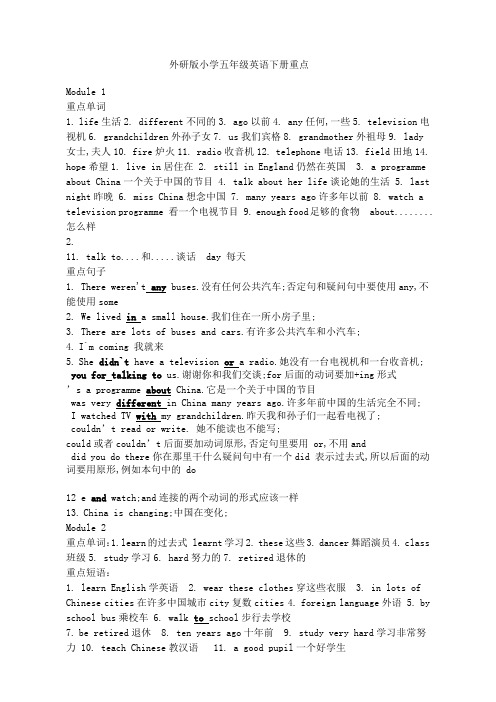
外研版小学五年级英语下册重点Module 1重点单词1.life生活2. different不同的3. ago以前4. any任何,一些5. television电视机6. grandchildren外孙子女7. us我们宾格8. grandmother外祖母9. lady女士,夫人10. fire炉火11. radio收音机12. telephone电话13. field田地14. hope希望1. live in居住在 2. still in England仍然在英国 3. a programme about China一个关于中国的节目 4. talk about her life谈论她的生活 5. last night昨晚 6. miss China想念中国 7. many years ago许多年以前 8. watch a television programme 看一个电视节目 9. enough food足够的食物 about........怎么样2.11. talk to....和.....谈话 day 每天重点句子1. There weren't any buses.没有任何公共汽车;否定句和疑问句中要使用any,不能使用some2. We lived in a small house.我们住在一所小房子里;3. There are lots of buses and cars.有许多公共汽车和小汽车;4.I`m coming 我就来5.She didn`t have a television or a radio.她没有一台电视机和一台收音机; you for talking to us.谢谢你和我们交谈;for后面的动词要加+ing形式’s a programme about China.它是一个关于中国的节目was very different in China many years ago.许多年前中国的生活完全不同;I watched TV with my grandchildren.昨天我和孙子们一起看电视了;couldn’t read or write. 她不能读也不能写;could或者couldn’t后面要加动词原形,否定句里要用 or,不用anddid you do there你在那里干什么疑问句中有一个did 表示过去式,所以后面的动词要用原形,例如本句中的 do12 e and watch;and连接的两个动词的形式应该一样13.China is changing;中国在变化;Module 2重点单词:1.learn的过去式 learnt学习2. these这些3. dancer舞蹈演员4. class 班级5. study学习6. hard努力的7. retired退休的重点短语:1. learn English学英语2. wear these clothes穿这些衣服3. in lots of Chinese cities在许多中国城市city复数cities4. foreign language外语5. by school bus乘校车6. walk to school步行去学校7.be retired退休 8. ten years ago十年前 9. study very hard学习非常努力 10. teach Chinese教汉语 11. a good pupil一个好学生12.dance过去式danced learn过去式learnt learn现在分词learning过去式made 过去式taught 过去式studied 16. go三单goes 17. dance名词dancer重点句子:1. Did your grandma learn English--Yes,she did. --No,she didn't.你奶奶学过英语吗是的,她学过;不,她没学过;2.He's learning English now. 他现在正在学英语;3.Why is she wearing these clothes为什么她穿这些衣服Because she was a dancer.因为她是一个舞蹈家;4.What did she do yesterdayShe make a cake.昨天她做什么了她做蛋糕了;5.Hai is an English teacher.陈海是一位英语老师;English前面要用anis learning English now.他现在正在学习英语;now表示现在进行时,所以learn 后面+inglearnt to dance 她学习跳舞;likes working at school;like 后跟动词ing 形式强调爱好;跟动词不定时强调动作Module 3重点单词:1. egg鸡蛋2. email电子邮件3. sandwich三明治4. traditional传统的5. delicious美味的,可口的6. hamburger汉堡7. eat的过去式ate吃8. give的过去式gave给9.drink的过去式 drank喝10. tonight今夜,今晚重点短语:1. an email from Lingling一封来自玲玲电子邮件2. English food英国食物3. have an English breakfast吃一顿英式早饭4. fish and chips鱼和薯条5. cook Chinese food 做中国食物6. a traditional English dinner一顿传统的英式晚餐7. have breakfast吃早饭8. have lunch吃午饭9. have dinner吃晚饭10. give one apple to my dog给我的小狗一个苹果重点句子:1. What did she have for breakfast 她早餐吃的是什么三餐前用介词for--I had eggs and sausages.我吃了是鸡蛋和香肠;2. What did you eat last night--I ate fish and chips.你昨天晚上吃的是什么我吃的是鱼和薯条3. What are you going to drink tonight今晚你打算喝什么--I 'm going to drink soup 我打算喝汤’ve got an email from Lingling;Module 4重点单词:1. library图书馆2. find找到CD-ROM电脑光盘3. bring带来,拿来4. use使用5. card卡片6. easy简单的7. information信息8. timetable时间表,时刻表9. dictionary字典10. newspaper报纸重点短语:1.library card 图书卡2. the books about computer关于计算机的书3. Excuse me.打扰了/对不起4. want to do sth.想做某事5. make an e-card for sb.为某人做电子贺卡6. be good at..对...擅长7. on shelf C在C架上8. go to the library去图书馆9. bring back带回来 10. in two week`s time在两周时间内11. in this timetable在这个时间表里12. find out找到 13. about train information关于火车信息14. in this dictionary在这本字典里 15. on this CD-ROM在这个CD光盘上this newspaper在这张报纸里 17. in this library在这个图书馆里18. at the zoo在动物园里 19. on TV在电视上过去式bought21. as well 也重点句子:1. Let’s Let usgo to the library. 让我们一起去图书馆;2. Here`sHere is our new computer.这是我们的新计算机;3. They’re in the wrong place;他们在错误的地方4. We can find a book abou t computers there.我们能找的一本关于电脑的书;5. Where are the books about computers, please请问,关于电脑的书在哪里--They are on shelf C.他们在C架上6.It`s easy with a computer使用电脑是很容易的7.You can find out about train information in this timetable.你能在这个时刻表里找到火车的信息;8.This is a guide for us to get information f orm the school library; Module 5重点单词:1. light轻的2. broken坏的,破的3. heavy重的4. pocket口袋,兜二5. hard困难的 umbrella雨伞重点短语1.big and light大而轻2. too big for you对你太大了3. be broken坏了/破了3.take it to China把他带到中国去 5. buy you a new one给你买一个新的6.at the Department Store在百货商店7. We`ll take it.我们将买它了7.be easy for sb.对某人来说很容易 9. try this one in white试试这个白色的10. big反义词small 11. heavy反义词light 12. new反义词broken 反义词hard 14. can否定形式can’t 15. she宾格her重点句子1. This black bag is nice. It's big. 这个黑色的包是漂亮的;它是大的;2. This blue one is big and light. 这个蓝色的是大的且轻的;3. It'll be easy for her to carry 对她来讲是提是容易的;并且它有两个口袋;photo照片 stay停留 week星期,周 parent父亲,母亲 ride骑马过去式rode, horse马 climb攀登,爬 holiday假日重点短语及知识点:last year去年 in the west 在…西边 play football踢足球 in July在七月every year每年 ride a horse骑马 go swimming去游泳 go过去式went photo 复数photos do过去式did stay过去式stayedlive第三人称单数lives ride过去式rode is过去式was have过去式had east东 west西south南north北重点句型:1. It’sXinjiang in the west of China.它新疆在中国的西部;2. We stayed with my grandmother for a week in July.七月我们和奶奶呆了一个星期;3. He lives there with his tree children.他和他的三个孩子住在那里;4. A: When did you go to Xinjiang你们什么时候去的新疆B: We went there in July.我们七月去的;5. A:Did you go with your mother and father你和你爸妈一起去的吗B:Yes,I did.\No,I didn’t.是,是的;\不,没有;6. A:Where did you go for your holiday你假期去哪里了B:I went to Yinchuan.我去了银川;: Can I see them,Lingling我能看看他们吗,玲玲B: Of course.当然;:Who is this这是谁B: It’s my uncle.是我的叔叔;mountains are really beautiful.这些山实在是太漂亮了;mountain后加s,所以用areis in the south of China;海南在中国的南方;is in the north of China 银川在中国的北方;Module 7.重点单词:evening傍晚,晚上,early早的,worker工人,taxi出租车,计程车,worry焦虑,担心,great非常好的,吸引人的,Chinese中国人,word词,字, draw的过去式drew画重点短语:1、every morning/evening/night每天早上/傍晚/晚上2、taxi driver出租车司机3、a quarter to eight 八点差一刻4、half past eight八点半5、be am/are/is going to将要,打算6、be late迟到 be late for7、of course当然重点句型:1、My father goes to work at eight o’clock every morning. 我爸爸每天早上八点钟去上班;2、What does he/she do 他/她做什么工作他/她从事什么职业回答:He's/She's a…他/她是一名……3、Are you going to be late,Dad 爸爸,你将会迟到/晚到吗4、What time will you be home 你什么时候回家回答:I'll be home at seven o'clock. 我七点回家;5、What about... ……怎么样/如何回答:Good idea /That's a great idea 好主意6、Will you help me 你会帮助我吗回答:Yes, I will. /No, I won't. 是的,我会;/不,我不会;’t worry ;别担心;Module 8重点单词:paper纸 word词 stick小木棍 piece张片 present礼物重点短语及知识点:In new york在纽约 about 关于 a toy panda玩具熊a kite风筝good idea 好主意I think so我认为这样 of course当然重点句型::What present can I take我带什么礼物呢BWhat about a toy panda玩具熊如何给别人提出建议使用What aboutit be windy in New York纽约有风吗:Will you help me B:Of course I will.肯定 Sorry.否定you fou your help.感谢你的帮助.’s a great idea.真是个好主意;Module 9重点单词:的过去式wore穿的复数 women女人演员的过去式told讲,告诉 , joke笑话 funny滑稽的, after在……以后, show演出 , ready准备好的 , soon不久 , bed床 , room房间 , history历史 question问题borrow借来 evening傍晚重点短语及知识点:a lot 许多 in English 用英语 last week上周 lots of许多 go to a restaurant去饭馆last night昨晚 the London Eye伦敦眼 in three weeks三周里 in the room在房间里Chinese history中国历史 Chinese songs中国歌曲 in the evenings在晚上 get过去式got go过去式went wear过去式wore tell过去式told is过去式was eat过去式ate buy过去式bought read 过去式read重点句型:1. I’ve got two letters in Engli sh.我收到两封英语信;2. Are you ready for your trip to America你准备好你的美国之旅了吗3. The men wore women’s clothes.男人们穿着女人的衣服;4. The actors told lots of jokes.演员们讲了许多笑话;5. We laughed a lot.我们欢笑不止;6. After the show we went to a restaurant.演出结束后我们去了饭馆;8. We are going to see you in three weeks.三周后我们就见面了;9. Dad is going to put another bed in my room. 爸爸打算在我的房间里再放一张床;10. Don’t forget to bring CDs of Chinese songs.不要忘了带中国歌曲的光盘;11. We can listen to them in the evenings. 我们能在晚上听;12. Dad is going to ask you some questions.爸爸要问你一些问题;13. Dad read a book about Chinese history. 爸爸读了一本关于中国历史的书;14. Mum bought a new dress for you. 妈妈给你买了条新裙子;borrowed a bike for you;Module 10重点单词:list目录,清单 airport机场 shoe鞋 ticket票 arrive到达 flat公寓taxi出租车 building建筑物 mademake过去式做 again再一次重点短语in New York在纽约 a good idea好主意 go to the airport去机场at the airport在机场 lots of许多 Chinese food中国食物 find out了解重点句型::Where are you going to go你打算去哪里 B: To the airport.去机场;2. I’m going to meet you in New York.我会去纽约接你;3. Make a list of things to do.把你做的事情列一张清单;: What are you going to take B: I’m going to take…:When are you going to go to the airport 你打算什么时候去机场B: I’m going to go to the airport at seven o’clock.我七点去机场;:Who is going to go the airport谁要去机场B: It’s me.是我7. We went in a yellow taxi to their flat.我们坐一辆黄色的出租车去了他们的公寓;are lots of tall buildings and lots of cars and people.有许多高楼大厦,小车和人;People 的复数people9. Grandma made Chinese food for you.奶奶给你做了中国食物;10. But I want to try American美国的food.但是我想试试美国食物;11. It will be all right.没事的;注意be12. Everyone speaks English.每个人都说英语;注意speak后面要加s ;Everyone,everybody,everything做主语时谓语要用第三人称单数形式;。
外研版五年级下册英语知识点总结

Module 1 知识点an old lady 一位老夫人 how about...怎么样?many years ago许多年前 talk to...跟...说话a television programme about China一个关于中国的电视节目have got拥有 has got拥有(单三)enough food足够的食物 every day 每天I'm coming. 我来了 China is changing. 中国正在改变Thank you for talking to us.谢谢跟我交谈。
last night 昨晚 talk about谈论关于…I hope you are well.我希望你一切都好。
cook on a fire烧火做饭 work in the fields干农活没有电视机。
(some和any 都是一些,some any用于否定句或者疑问句。
)昨天我和我的孙子们看了电视。
She didn’t have a television or a radio.她没有电视机也没有收音机。
She couldn’t read or write.她不会读也不会写。
I hope you are well。
我希望你一切都好。
表示某地有某物,我们可以使用there be句型来表示。
there is+(名词单数或不可数名词)单数过去式为:there was+(可数名词单数或不可数名词)名词复数)复数过去式为:名词复数)there be 的就近原则is a pen and two pencils on the desk.are two pencils and a pen on the desk.Module2一、单词learn的过去式---learnt teach的过去式---taught study的过去式----studied write的过去式----wrote二、短语1.write a book 写一本书2.in lots of Chinese cities 在许多中国城市3.foreign languages 外语4.learn English学习英语5. make a cake 做蛋糕6.do homework做家庭作业7. in his class 在他的班级8. a good pupil 一个好学生9. study hard 努力学习10. an English teacher 一位英语老师11. walk to school 走路去学校12. by school bus乘坐校车三、句型1. 询问他人做过某事的句型及回答例:Did she learn any foreign languages?问:Did+主语+动词原形+其他?答:Yes, 人称代词主格+did.No, 人称代词主格+didn’t.2. 描述他人做过某事例:She learnt English.主语+动词过去式+其他.3. 描述他们现在在做某事例:He is learning English now.主语+ be + 动词-ing + 其他.Module3.短语an email from …一封来自…的电子邮件 have got 有,拥有have an English breakfast吃一顿英式早餐fish and chips 炸鱼和炸薯条 English food 英式食物a traditional English dish一种传统的英式菜肴eat four hamburgers吃四个汉堡包 very much很,非常give …to…把…给… cook Chinese food 做中餐.动词过去式have—had do---did eat—ate buy---bought give—gave is---was are---were.重点句型What did+主语+have for+三餐?例句:What did she have for breakfast?她早餐吃了什么?主语+had+食物名称例句:She had eggs and sausages.她吃了鸡蛋和香肠。
外研版五年级下学期英语第一模块学习重点

外研版五年级下学期英语第一模块学习重点一、重点单词:life生活 different不同的 ago以前 any任何.一些 television电视机us我们(宾格)grandchildren(外)孙子(女)(复数)grandmother(外)祖母 lady女士,夫人 fire炉火radio收音机 telephone电话 field田地 hope希望二、重点短语及知识点:a small house一所小房子 a big house一所大房子in Englanin China在中国 many years ago许多年前enough food充足的食物 lots of许多.大量have got有.拥有 watch TV看电视 every day每天four years ago四年前 live in居住在…里last night昨晚 an old lady一位老妇人talk about讨论.谈论on a fire在炉火上 in the field在田地里live(过去式)lived change(现在分词)changingis(过去式)wasare(过去式)were was(否定形式)wasn’twere(否定形式)weren’t bus(复数)busesdo(过去式)did did(否定形式)didn’twatch(过去式)watched cook(过去式)cookedwork(过去式)worked stay(单三)stayscould(过去式)couldn’t go(单三)goes三、重点句型:1.Lingling is still in England with Sam and Amy.玲玲仍然和山姆艾米在英国。
2.It’s a programme about China.这是一个关于中国的节目。
3. Life was very different in China many years ago.许多年前在中国的生活是完全不同的。
外研社五年级英语下册知识点
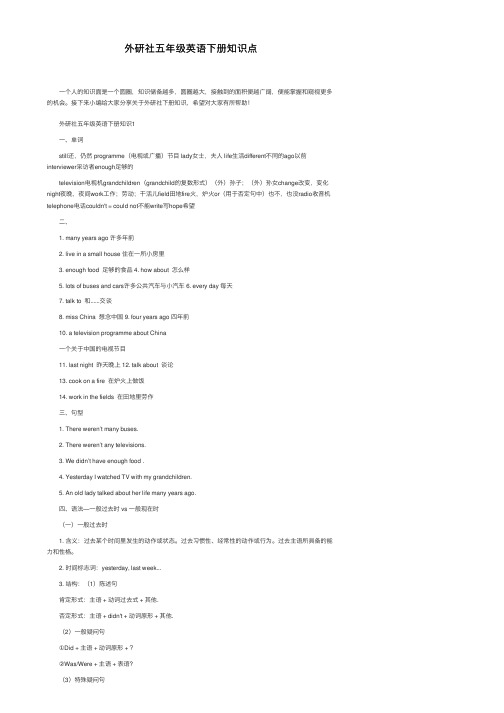
外研社五年级英语下册知识点⼀个⼈的知识⾯是⼀个圆圈,知识储备越多,圆圈越⼤,接触到的⾯积便越⼴阔,便能掌握和窥视更多的机会。
接下来⼩编给⼤家分享关于外研社下册知识,希望对⼤家有所帮助!外研社五年级英语下册知识1⼀、单词still还,仍然 programme(电视或⼴播)节⽬ lady⼥⼠,夫⼈ life⽣活different不同的ago以前interviewer采访者enough⾜够的television电视机grandchildren(grandchild的复数形式)(外)孙⼦;(外)孙⼥change改变,变化night夜晚,夜间work⼯作;劳动;⼲活⼉field⽥地fire⽕,炉⽕or(⽤于否定句中)也不,也没radio收⾳机telephone电话couldn't = could not不能write写hope希望⼆、1. many years ago 许多年前2. live in a small house 住在⼀所⼩房⾥3. enough food ⾜够的⾷品4. how about 怎么样5. lots of buses and cars许多公共汽车与⼩汽车6. every day 每天7. talk to 和......交谈8. miss China 想念中国 9. four years ago 四年前10. a television programme about China⼀个关于中国的电视节⽬11. last night 昨天晚上 12. talk about 谈论13. cook on a fire 在炉⽕上做饭14. work in the fields 在⽥地⾥劳作三、句型1. There weren’t many buses.2. There weren’t any televisions.3. We didn’t have enough food .4. Yesterday I watched TV with my grandchildren.5. An old lady talked about her life many years ago.四、语法—⼀般过去时 vs ⼀般现在时(⼀)⼀般过去时1. 含义:过去某个时间⾥发⽣的动作或状态。
最新外研版五年级下册英语知识点整理(全册)
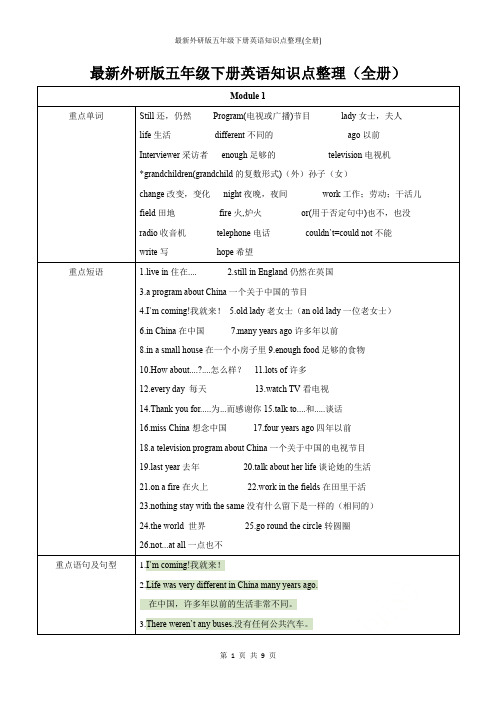
Module 4
重点单词
library图书馆student学生sent(send的过去式)发送,寄
*CD激光唱片,光盘idea主意,想法put放,安放
*shelf架子heavy重的,沉的dictionary词典;字典
5.Welcome to Beijing!欢迎到北京!6.go shopping购物
7.take a walk散步8.do one`s homework做作业9.make a cake做蛋糕
10.ten years ago十年前11.teach Chinese教汉语12.in his class在他的班里
15.give sth. To sb.把某东西给某人16.Chinese food中国食物
17.be going to do sth.准备做某事18.cook Chinese foodfor...为....做/烹饪中国食物19.with love致以我们的爱st night昨晚
21.tonight今晚22.eat sth.吃某物23.drink sth.喝某物
最新外研版五年级下册英语知识点整理(全册)
Module 1
重点单词
Still还,仍然Program(电视或广播)节目lady女士,夫人
life生活different不同的ago以前
Interviewer采访者enough足够的television电视机
*grandchildren(grandchild的复数形式)(外)孙子(女)
9.We`ll take it.(在这里)我们将买它了。10.too big for you对你太大了
11.try this one in white试试这个白色的
外研版五年级下册英语知识点总结

外研版五年级下册英语知识点总结外研版五年级下册英语知识点第一模块短语1. many years ago 许多年前2. live in a small house 住在一所小房里3. enough food 足够的食品4. how about 怎么样5. lots of buses and cars许多公共汽车与小汽车6. every day 每天7. talk to 和交谈8. miss China 想念中国9. four years ago 四年前10. a television programme about China 一个关于中国的电视节目11. last night 昨天晚上12. talk about 谈论13. cook on a fire 在炉火上做饭14 work in the fields 在田地里劳作句型1、There was(were)+某人或某物+某地2、过去式:We didn’t have enough food .句型:肯定句:主语+动词过去式+其他否定句:主语+be动词过去式+not+其他或主语+did not+动词原形+其他外研版五年级下册英语知识点第二模块短语1. in lots of Chinese cities 在许多中国城市2. foreign language 外语3. learn English 学习英语4. welcome to Beijing 欢迎到北京来5. make a cake 做蛋糕6. do homework 做家庭作业7. in his class 在他的班级8. a good pupil 一个好学生9. study hard 努力学习10. an English teacher 一位英语老师11. walk to school 走路去学校12. by school bus 乘坐校车句型1、询问他人做过某事的句型及回答句型例:Did she learn any foreign languages?问:Did+主语+动词原形+其他答:Yes ,人称代词主格+did .或No ,人称代词主格+didn’t .2、描述他人做过某事例:She learnt English . 主语+动词过去式+其他3、描述他们现在在做某事例:He is learning English now .主语+be+动词ing+其他外研版五年级下册英语知识点第三模块短语1.have got 拥有2.an e-mail from Linglin一封来自玲玲的电子邮件3.about English food 关于英国食物4.have an English breakfast 吃了一顿英式早餐5.have …for lunch 吃作为午餐6.a traditional English dinner 一顿传统的英式晚餐7.very different 非常不同8.give …to … 把给9.at school 在学校10.cook Chinese food for Llingling 为玲玲做中式食物11.be going to 打算12.tell a story 讲故事句型1、描述吃过某些食物:主语+ had + 食物名称+ 其他2、询问他人打算吃/喝什么:What are you going to eat/drink ?3、询问他人三餐吃了什么:What + did + 主语+ have + for breakfast / lunch / dinner ?外研版五年级下册英语知识点第四模块单词Library 图书馆find 找到CD-ROM 电脑光盘bring带来use使用card 卡片easy简单的information信息timetable时间表dictionary字典newspaper 报纸短语1. want to 想要2. make an e-card for Mum 为妈妈制作一张电子卡片3. be good at 擅长4. go to the library 去图书馆5. find a book about e-cards 找到一本关于电子卡片的书6. at the library 在图书馆7. the book about computers 关于电脑的书8. on Shelf C 在C架上9. library card 借书卡10. bring back 带回来11. in two weeks’ time 在两周时间内12. use our computer 使用我们的电脑13. be easy with 用很简单14. find out 找到、找出15. in this dictionary 在这本词典里16. on this CD-ROM 在这张光盘上17. in this newspaper 在这张报纸上18. at the zoo 在动物园19. on TV 在电视上句型询问某物在何处及回答的句型:1、Where are theabout,please ?2、Where can you find out about ?3、You can find out in / on外研版五年级下册英语知识点第五模块短语1. send an email 发送电子邮件2. a computer message 电脑信息3. from…to … 从…..到…..4. a good idea 一个好主意5. an idea 一个主意6. click on 点击7. write your message 写你的信息8. at work 在工作9. an email from little Tom 一封来自小Tom的电子邮件10. make a poster 制作海报11. thank you for… 为……而感谢12. work hard 努力工作13. at the office 在办公室14. be busy 忙碌的15. be home 在家16. at seven o’clock 在七点钟17. on the train 在火车上18. stand up 起立19. run to the blackboard 跑向黑板20. on the blackboard 在黑板上句型1、another和the other : another用于三者以上的“其中一个”,the other用于两者之间2、英语时间的表达:①10:00 ten o’clock ②1:58 one fifty-eight ③7:10 ten past seven ④9:48 twelve to ten ⑤4:45 a quarter to five ⑥9:30 half past nine。
外研版五年级下册英语知识要点梳理

外研版五年级下册英语知识要点梳理Unit 1: My Day- 词汇:time, wake up, get up, have breakfast, go to school, have lunch, go home, do homework, have dinner, go to bed- 句型:What time do you...? I...at...- 对话练:编写对话练,讨论每天做什么事情以及时间。
Unit 2: At the Zoo- 词汇:zoo, elephant, giraffe, lion, tiger, monkey, panda, snake, bird, kangaroo- 句型:What animal can you see? I can see a/an...- 阅读练:阅读短文,回答关于动物的问题。
Unit 3: In the Garden- 词汇:garden, flower, tree, grass, butterfly, ladybird, insect, bee, ant, spider- 句型:Can you see any...? Yes, I can see a/an.../No, I can't see any...- 描述练:描述花园里的不同事物,并使用合适的句型进行回答。
Unit 4: At the Farm- 词汇:farm, farmer, cow, sheep, pig, horse, duck, chicken, goat, rabbit- 句型:What can you see at the farm? I can see a/an...- 对话练:编写对话练,谈论农场里常见的动物以及它们的特征。
Unit 5: On the Island- 词汇:island, beach, sea, boat, sand, shell, palm tree, fish, crab, seagull- 句型:What can you do on the island? I can...- 书写练:写一个短文,描述在岛上可以做的各种活动。
五年级英语下册单元知识点汇总(外研版三起点)
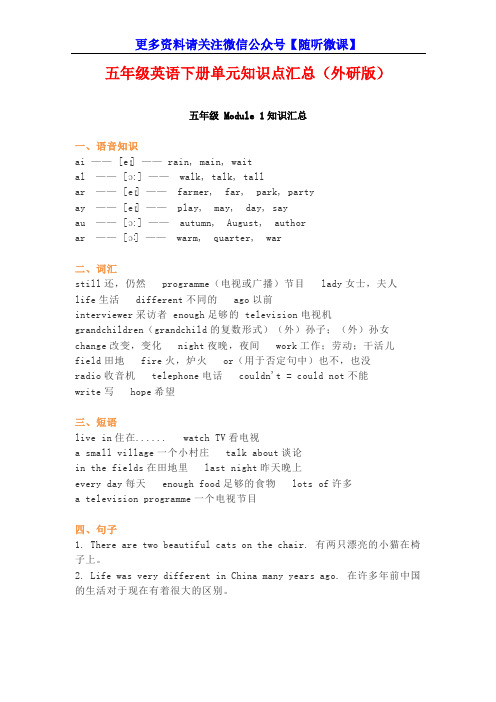
五年级英语下册单元知识点汇总(外研版)五年级 Module 1知识汇总一、语音知识ai —— [eɪ] —— rain, main, waital —— [ɔ:] ——walk, talk, tallar —— [eɪ] ——farmer, far, park, partyay —— [eɪ] ——play, may, day, sayau —— [ɔ:] ——autumn, August, authorar —— [ɔː] ——warm, quarter, war二、词汇still还,仍然programme(电视或广播)节目lady女士,夫人life生活different不同的ago以前interviewer采访者 enough足够的 television电视机grandchildren(grandchild的复数形式)(外)孙子;(外)孙女change改变,变化night夜晚,夜间work工作;劳动;干活儿field田地fire火,炉火or(用于否定句中)也不,也没radio收音机telephone电话couldn't = could not不能write写hope希望三、短语live in住在...... watch TV看电视a small village一个小村庄talk about谈论in the fields在田地里last night昨天晚上every day每天enough food足够的食物lots of许多a television programme一个电视节目四、句子1. There are two beautiful cats on the chair. 有两只漂亮的小猫在椅子上。
2. Life was very different in China many years ago. 在许多年前中国的生活对于现在有着很大的区别。
3. We lived in a small house. We didn’t have enough food. There weren’t many buses. There weren’t any televisions. 我们住在小房子了里。
外研版五年级英语下册知识点总结
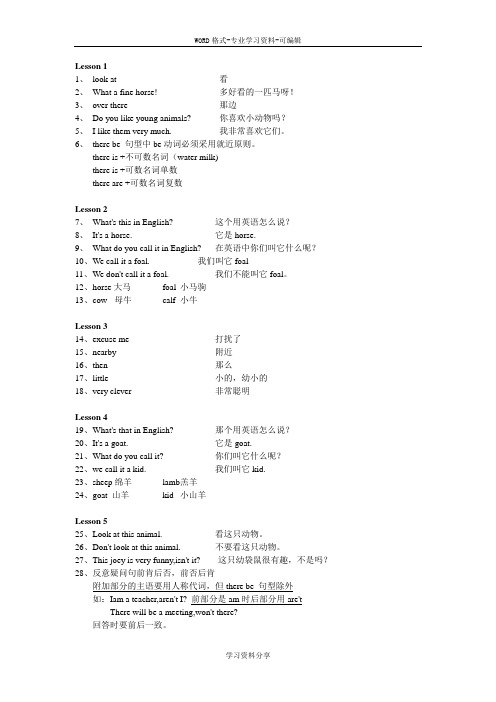
Lesson 11、look at 看2、What a fine horse! 多好看的一匹马呀!3、over there 那边4、Do you like young animals? 你喜欢小动物吗?5、I like them very much. 我非常喜欢它们。
6、there be 句型中be动词必须采用就近原则。
there is +不可数名词(water milk)there is +可数名词单数there are +可数名词复数Lesson 27、What's this in English? 这个用英语怎么说?8、It's a horse. 它是horse.9、What do you call it in English? 在英语中你们叫它什么呢?10、We call it a foal. 我们叫它foal11、W e don't call it a foal. 我们不能叫它foal。
12、horse大马foal 小马驹13、cow 母牛calf 小牛Lesson 314、excuse me 打扰了15、nearby 附近16、then 那么17、little 小的,幼小的18、very clever 非常聪明Lesson 419、What's that in English? 那个用英语怎么说?20、It's a goat. 它是goat.21、What do you call it? 你们叫它什么呢?22、we call it a kid. 我们叫它kid.23、sheep绵羊lamb羔羊24、goat 山羊kid 小山羊Lesson 525、Look at this animal. 看这只动物。
26、Don't look at this animal. 不要看这只动物。
27、This joey is very funny,isn't it? 这只幼袋鼠很有趣,不是吗?28、反意疑问句前肯后否,前否后肯附加部分的主语要用人称代词,但there be 句型除外如:Iam a teacher,aren't I? 前部分是am时后部分用are'tThere will be a meeting,won't there?回答时要前后一致。
外研版五年级下英语知识点整理

五年级下英语外研版教材的知识点主要包括以下几个方面:1.语音五年级下册主要学习辅音字母组合的发音规则,如:- sc-/sk-/skr-/st-/sp-/sw- 组合产生的音- wh- /wr- /kn- /gn- /mb- /dg- /ght- /gn- /ps- /pt- /pn- 组合产生的音- -dge/ -tch / eer / ear -结尾的音- -tive / -cious / -ceous / -ful / -less / -ness / -ment / -ship / -dom / -ish / -ible / -ous / -ic / -logy / -graph / -phone / -graph / -scope / -arium / -y / -ance / -ence等词缀读音规则- 元音字母的发音规则如:oo /ə/,oo /u:/,ai /ei/,ea /e/等2.词汇五年级下册新增了大量的词汇,主要包括:- 名词:skydiving, cycling, karate, judo, zookeeper, goalkeeper, skateboard, volleyball, cinema, museum, guitar, piano, trumpet, postage stamps, rabbit, parrot, hamster, guinea pig等。
- 动词:fly, dive, cycle, skate, play the guitar, play the piano, play the trumpet, listen to, write, phone, paint, draw, arrive, collect, say, touch, bring等。
- 形容词:exciting, wonderful, giant, noisy, dirty, clean, tiny, slimy, wavy等。
- 1、下载文档前请自行甄别文档内容的完整性,平台不提供额外的编辑、内容补充、找答案等附加服务。
- 2、"仅部分预览"的文档,不可在线预览部分如存在完整性等问题,可反馈申请退款(可完整预览的文档不适用该条件!)。
- 3、如文档侵犯您的权益,请联系客服反馈,我们会尽快为您处理(人工客服工作时间:9:00-18:30)。
Lesson 11、look at 看2、What a fine horse! 多好看的一匹马呀!3、over there 那边4、Do you like young animals? 你喜欢小动物吗?5、I like them very much. 我非常喜欢它们。
6、there be 句型中be动词必须采用就近原则。
there is +不可数名词(water milk)there is +可数名词单数there are +可数名词复数Lesson 27、What's this in English? 这个用英语怎么说?8、It's a horse. 它是horse.9、What do you call it in English? 在英语中你们叫它什么呢?10、We call it a foal. 我们叫它foal11、W e don't call it a foal. 我们不能叫它foal。
12、horse大马foal 小马驹13、cow 母牛calf 小牛Lesson 314、excuse me 打扰了15、nearby 附近16、then 那么17、little 小的,幼小的18、very clever 非常聪明Lesson 419、What's that in English? 那个用英语怎么说?20、It's a goat. 它是goat.21、What do you call it? 你们叫它什么呢?22、we call it a kid. 我们叫它kid.23、sheep绵羊lamb羔羊24、goat山羊kid 小山羊Lesson 525、Look at this animal. 看这只动物。
26、Don't look at this animal. 不要看这只动物。
27、This joey is very funny,isn't it?这只幼袋鼠很有趣,不是吗?28、反意疑问句前肯后否,前否后肯附加部分的主语要用人称代词,但there be 句型除外如:Iam a teacher,aren't I? 前部分是am时后部分用are't There will be a meeting,won't there?回答时要前后一致。
如:Yes,I am . No,I'm not.Lesson 629、Is this a tiger? Yes,it is. 这是只老虎吗?是的,它是。
30、Is that a lion? No,it isn't. 那是头狮子吗?不,它不是。
31、What can we call it? 我们叫它什么?32、We can call it a cub. 我们叫它cub。
33、lion 狮子cub 幼狮34、kangaroo 袋鼠joey 幼袋鼠35、monkey 猴子rabbit 兔子36、bird 鸟tiger 老虎37、mouse 老鼠elephant 大象★what 引导的感叹句(主要修饰名词)what + 名词!what + a/an + 可数名词单数!what + a/an + 形容词+可数名词单数!what + a/an + 形容词+可数名词单数+主语+谓语!what+形容词+可数名词复数+主语+谓语!★how 引导的感叹句(主要修饰形容词)how + 主语+谓语!how + 副词+主语+谓语!how + 形容词+主语+谓语+其他!Lesson 71、in the pond 在池塘里2、How lovely they are! 它们多可爱啊!3、of course 当然4、I know their mother is a duck. 我知道它们的妈妈是只鸭子。
5、Can they swim? Certainly not. 它们会游泳吗?当然不会。
6、some 表示一些用于肯定句中可修饰可数名词复数和不可数名词;在疑问句中表示建议请求或希望得到肯定回答时意为少许,一点儿如:Would you like some coffee?Lesson 87、What are these?8、They're hens.9、Can ducklings swim?10、Yes,they can./No,they can't./Certainly.11、h en 母鸡chick 小鸡12、duck鸭子duckling 小鸭子13、goose 鹅gosling 小鹅geese 鹅复数14、rooster 公鸡Lesson 915、Here is a pet shop. 这有一家宠物商店。
16、Shall we look at the pets in it? 我们看看里面的宠物好吗?17、What lovely kittens! 多可爱的小猫咪啊!18、Baby pigs are called piglets. 猪宝宝被叫做piglets。
19、How cut. 太可爱了!20、together 一起baby 婴儿,幼小的Lesson 10Lesson 1127、circus 马戏团,马戏表演28、perform 演出,表演29、want to do sth. 想做某事30、They can do a lot of things. 它们会做许多事。
31、a lot of =lots of 许多32、dance 跳舞33、swing 摇摆,摇荡,摆动Lesson 1234、Are these tigers? 这些是老虎吗?35、Yes, they are. 是的,它们是。
36、 A re those tigers? 那些是老虎吗?37、No,they aren't.They're lions. 不,它们不是,它们是狮子。
38、The tiger cubs can't jump through a ring.小老虎不会跳火圈。
39、tiger 老虎tiger cub 幼虎40、lion 狮子lion cub 幼狮41、jump through a ring 跳火圈42、ride a horse 骑马43、climb up a ladder 爬梯子44、ride a bike 骑自行车★可数名词复数:1、一般情况下词尾直接加S2、以s,x,ch,sh结尾的名词后加es3、以“辅音字母+y”结尾的词,把y变为i加es4、以“元音字母+y”结尾的词,直接加s 如:boys5、以f 或fe 结尾的词,先把f或fe变为v,再加es6、以"元音字母+o"结尾的词,直接加s7、以"辅音字母+o"结尾的词,在词尾加es8、不规则的名词复数如:man--men,goose--geese,foot--feet,tooth--teeth,child--children,mouse--mice,ox--oxen9、单复数相同的词语:Chinese,japanese, people,sheep , fish, deer(鹿)Lesson 13Let me show you around. 让我带你参观一下。
this way 这边走Do you often come to the library? 你们经常来图书馆吗?That's good. 那很好。
visitor 参观者,游客headmaster 校长show sb. around 带某人参观show sb. Sth.=show sth. to sb. 给……看(sb.用宾格)borrow……from 表示从哪里借进来lend sb. Sth.=lend sth. to sb. 表示把某物借给某人Lesson 14Welcome to our school! 欢迎来到我们的学校。
We often borrow books from the library.我们经常从图书馆借书。
school 学校classroom 教室library 图书馆borrow books 借书处read stories 读故事make things 制作东西How interesting! 真有趣!Lesson 15science lab 科学实验室how often 表示多久一次how many 表示多少,用于可数名词;how much 表示多少,用于不可数名词how old 表示询问年龄twice a week 每周两次language lab 语音实验室That's great!太棒了!listening 听reading读speaking说writing 写activity 活动Lesson 16We have three English classes a week. 我们每周有三节英语课。
Do you often read in the library? 你们经常在图书馆里读书吗?Yes,we do./No,we don't. 是的,经常。
/不,不经常。
do experiments 做实验do listening 做听力练习observe things 观察事物do speaking 做口语练习Lesson 17Look at this new building! 看看这座新大楼!meeting hall 会议室Children's Day 儿童节New Year's Day 新年in the club 在俱乐部be interested in +动名词对……感兴趣be good at + 动名词擅长……performance 演出,表演Lesson 18How many music classes do you have a week? 你们每周有多少节音乐课?We have two. 我们有两节。
What do you do in the music club? 你们在音乐俱乐部里做什么?We often sing and dance. 我们经常唱歌和跳舞。
music club 音乐俱乐部art club 美术俱乐部play the violin 拉小提琴play the piano 弹钢琴listen to music 听音乐paint (用颜料)绘画draw (用铅笔等)画Lesson 19in groups 分组All the chairs and desks are in groups. 所有的桌椅都是分组的。
We usually do group work. 我们通常做小组工作。
